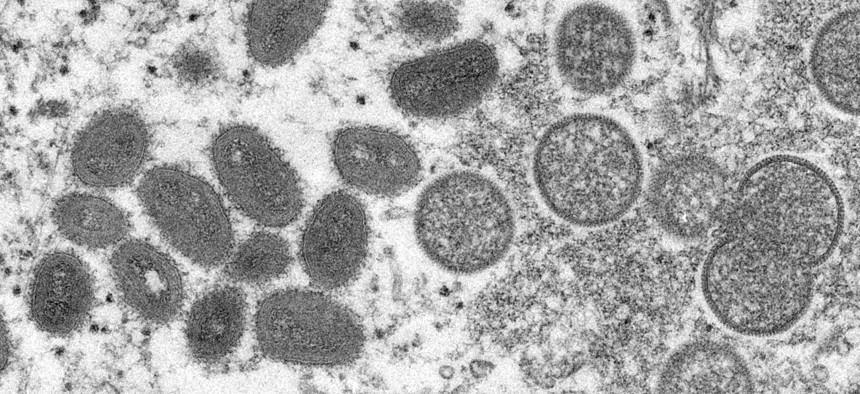
Electron microscope image of various virions (virus particles) of the monkeypox virus taken from human skin in 2003. Smith Collection/Gado/Getty Images
There are Vaccine Possibilities for Monkeypox, CDC Says
Though there is “strong scientific concern” that monkeypox is spreading differently than in the past, the current case count is low and there’s not a huge risk to the general community, a CDC official says.
The federal public health agency is working to mitigate the recent outbreak of monkeypox, a rare but potentially severe disease, through possible treatments and vaccines as well as various forms of guidance.
Over the last two weeks, Europe, the United States and Australia have reported cases of monkeypox, which starts with flu-like symptoms and swelling of the lymph nodes then goes to a rash across the face and body. Following the United States’ preparations for smallpox, which was declared eradicated in 1980, but is related to monkeypox, the federal government can now tap into those tools, said Centers for Disease Control and Prevention officials.
“We have a good stock of vaccines. We’ve been preparing for the possibility of needing to use it for smallpox,” Capt. Jennifer McQuiston, deputy director of the Division of High Consequence Pathogens and Pathology at the CDC, said on a briefing call on Monday. “We have something called the Strategic National Stockpile that has invested resources and energy into making sure we have adequate stocks of vaccines.”
There are two vaccines that could possibly be used to prevent monkeypox in people who have had contact with the virus and “we’re working now to develop recommendations to ensure that the vaccine supplies that we have are available to those who need it and that doctors can use it to decide what’s right for their patients,” she added.
One vaccine, Jynneos, is a two-dose regimen, and the United States currently has over 1,000 doses available with more to come as the company increases production of it. McQuiston said there has already been a request for this vaccine for some high-risk contacts.
The other possible vaccine for monkeypox, ACAM2000, is “an older-generation smallpox vaccine that has some potential significant side effects with it. So, a decision to use that widely would have to have some serious discussion behind it,” McQuiston said. The United States has over 100 million doses of it.
Healthcare workers, those who’ve encountered monkeypox patients and those with high risk for disease will be prioritized for vaccine distribution, she added. McQuiston also said that many people recover on their own in two to four weeks.
There are two antivirals that have been approved in the United States to treat smallpox: TPOXX and TEMBEXA. The CDC has special authority to use TROXX to treat monkeypox and is working on treatment guidance for health care providers to determine who should receive it, said Dr. Brett Peterson, a medical officer with the CDC's Poxvirus and Rabies Branch, on the call.
As for TEMBEXA, the “Strategic National Stockpile is in the process of negotiating with the manufacturer for the procurement of this for the national stockpile,” and the CDC is working to obtain special authority to use it for monkeypox as well.
In the current monkeypox cases, the strain is the West African one and the milder of the two. As of Monday morning, in the United States there has been one confirmed case of monkeypox in Massachusetts, and four confirmed cases of orthopox, which is in the family of viruses that include monkeypox and the CDC is presuming are monkeypox in New York, Florida, and two in Utah. The cases of infections are all in men who have traveled recently, but none to Africa, CDC officials said.
In addition to tracking the domestic cases, the CDC is also looking at cases “that have been reported within the past two weeks in several countries that don’t normally report monkeypox, including Portugal, Spain, and the United Kingdom,” said a statement from the agency. “It’s not clear how people in those clusters were exposed to monkeypox, but cases include individuals who self-identify as men who have sex with men.”
There is “strong scientific concern” that monkeypox is spreading differently than it has in the past, but since the case count is currently low there is not a huge risk to the general community, McQuiston said.
The CDC advised on Monday to “practice enhanced precautions,” while traveling due to monkeypox, which is a warning level two out of three.
Monkeypox was first discovered in 1958; the first human case was detected in 1970 in the Democratic Republic of the Congo. While monkeypox cases have predominantly been detected in West and Central Africa countries it has not been unheard of for cases to originate elsewhere.
The United States had its first-ever outbreak of monkeypox in 2003, which was linked to infected pet prairie dogs. There were 47 confirmed and probable cases. Over the past five years there has been a re-emergence of monkeypox in Nigeria, which has led to at least eight known cases of it internationally.







